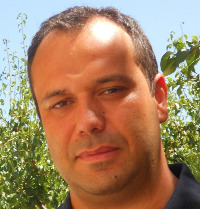
Davide Brunelli
|
|
Formazione |
||||||||||||||||||||||||||||||||||||||||||||||||||||||||||||||||||||||||||||||||||||||||||||||||||||||||||||||||||||||||||||||||||||
|
|||||||||||||||||||||||||||||||||||||||||||||||||||||||||||||||||||||||||||||||||||||||||||||||||||||||||||||||||||||||||||||||||||||
|
|
Carriera accademica ed attività didattica |
||||||||||||||||||||||||||||||||||||||||||||||||||||||||||||||||||||||||||||||||||||||||||||||||||||||||||||||||||||||||||||||||||||
|
Prof. Davide BRUNELLI https://research.com/u/davide-brunelli https://www.scopus.com/authid/detail.uri?authorId=22233293600

Degree in Electrical Engineering (2002), PhD in Electrical Engineering (2007) from the University of Bologna. From 2005 to 2007 he has been visiting researcher at ETHZ studying to develop methodologies for Energy Harvesting aware embedded design. He currently cooperates with ETHZ on energy efficient distributed sensor platforms. He was scientific supervisor of several EU FP7 projects: EEB-ENV-3ENCULT, ICT-GENESI and FP7 Network of Excellence - ARTISTDESIGN - Design for embedded systems. He was leading industrial cooperation activities with Telecom Italia, STMicroelectronics and Hewlett-Packard. Member of several Technical Program Committees of conferences in the field of sensor networks and energy management, including the The Design, Automation, and Test in Europe (DATE) conference and the IEEE International Conference on Emerging Technologies and Factory Automation, the International Workshop on Energy in Wireless Sensor Networks. He is author of more than 230 paper in international journals and conferences, that have been cited more than 6317 times, with an H-index of 48 (source Google Scholar). Web Site: https://webapps.unitn.it/du/en/Persona/PER0061723/Curriculum |
|||||||||||||||||||||||||||||||||||||||||||||||||||||||||||||||||||||||||||||||||||||||||||||||||||||||||||||||||||||||||||||||||||||
|
|
Interessi di ricerca |
||||||||||||||||||||||||||||||||||||||||||||||||||||||||||||||||||||||||||||||||||||||||||||||||||||||||||||||||||||||||||||||||||||
|
|||||||||||||||||||||||||||||||||||||||||||||||||||||||||||||||||||||||||||||||||||||||||||||||||||||||||||||||||||||||||||||||||||||
|
|
Attività di ricerca |
||||||||||||||||||||||||||||||||||||||||||||||||||||||||||||||||||||||||||||||||||||||||||||||||||||||||||||||||||||||||||||||||||||
|
Here is a list of the Research projects I have been/am involved
|
|||||||||||||||||||||||||||||||||||||||||||||||||||||||||||||||||||||||||||||||||||||||||||||||||||||||||||||||||||||||||||||||||||||
|
|
Appartenenza a società e comitati scientifici |
||||||||||||||||||||||||||||||||||||||||||||||||||||||||||||||||||||||||||||||||||||||||||||||||||||||||||||||||||||||||||||||||||||
|
Commissions of Trust 2020 Independent Expert Evaluator for Piemonte Region start-up call (FinPiemonte) 2014, 2019 Independent Expert Evaluator for the European H2020 calls 2015-2019 Independent Expert Evaluator for Kazakhstan National Projects “EXPO 2017's Asthana” 2015 Independent Expert Evaluator for The Croatian Science Foundation (HRZZ), peer review for Croatian National Projects on embedded electronic systems 2015 Independent Expert Evaluator for Czech Science Foundation, peer review for Czech National Projects on electronic systems and energy harvesting. 2013 Ph.D. dissertation committee member, University of Zagreb, Croatia 2010-2014 Scientific Advisory Board of KissMyBike srl, Startup on IoT device and services, Italy 2008-Today Reviewer for several Journal: Microelectronics J. (since 2008), IEEE-TIE (since 2010), ACM-TECS, IEEE-Very Large Scale Integration Systems (since 2010), IEEE-TPELS (since 2011), IEEE-TC (since 2010), ACM-TOSN (since 2009), IEEE-TII (since 2011), IEEE-TIM (2009).
|
|||||||||||||||||||||||||||||||||||||||||||||||||||||||||||||||||||||||||||||||||||||||||||||||||||||||||||||||||||||||||||||||||||||
|
|
Premi e riconoscimenti |
||||||||||||||||||||||||||||||||||||||||||||||||||||||||||||||||||||||||||||||||||||||||||||||||||||||||||||||||||||||||||||||||||||
|
|||||||||||||||||||||||||||||||||||||||||||||||||||||||||||||||||||||||||||||||||||||||||||||||||||||||||||||||||||||||||||||||||||||
|
|
Convegni e conferenze |
||||||||||||||||||||||||||||||||||||||||||||||||||||||||||||||||||||||||||||||||||||||||||||||||||||||||||||||||||||||||||||||||||||
|
|||||||||||||||||||||||||||||||||||||||||||||||||||||||||||||||||||||||||||||||||||||||||||||||||||||||||||||||||||||||||||||||||||||
|
|
Altre attività |
||||||||||||||||||||||||||||||||||||||||||||||||||||||||||||||||||||||||||||||||||||||||||||||||||||||||||||||||||||||||||||||||||||
Technology transfer
Active and Past CollaborationsETHz (CH) and University of Bologna (IT), Prof. Luca Benini, luca.benini@unibo.it |
|||||||||||||||||||||||||||||||||||||||||||||||||||||||||||||||||||||||||||||||||||||||||||||||||||||||||||||||||||||||||||||||||||||













